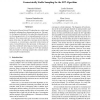Free Online Productivity Tools
i2Speak
i2Symbol
i2OCR
iTex2Img
iWeb2Print
iWeb2Shot
i2Type
iPdf2Split
iPdf2Merge
i2Bopomofo
i2Arabic
i2Style
i2Image
i2PDF
iLatex2Rtf
Sci2ools
108
click to vote
3DIM
2003
IEEE
2003
IEEE
Geometrically Stable Sampling for the ICP Algorithm
The Iterative Closest Point (ICP) algorithm is a widely used method for aligning three-dimensional point sets. The quality of alignment obtained by this algorithm depends heavily on choosing good pairs of corresponding points in the two datasets. If too many points are chosen from featureless regions of the data, the algorithm converges slowly, finds the wrong pose, or even diverges, especially in the presence of noise or miscalibration in the input data. In this paper, we describe a method for detecting uncertainty in pose, and we propose a point selection strategy for ICP that minimizes this uncertainty by choosing samples that constrain potentially unstable transformations.
Related Content
| Added | 04 Jul 2010 |
| Updated | 04 Jul 2010 |
| Type | Conference |
| Year | 2003 |
| Where | 3DIM |
| Authors | Natasha Gelfand, Szymon Rusinkiewicz, Leslie Ikemoto, Marc Levoy |
Comments (0)

